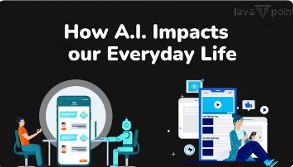Impacts of Artificial Intelligence in Everyday LifeIt's appealing to picture some prophetic science fiction future in which machines have taken over the planet and enslaved humans when we speak about artificial intelligence. But in reality, artificial intelligence is a means of helping humans work together with intelligent programs to achieve greater. It is necessary to consider it as giving technological advances an additional human face. This includes giving it the ability to acquire knowledge from the vast quantities of information, which is at present accessible, to comprehend and react to our language, and to perceive and comprehend the surroundings in the same manner that humans perform.  Artificial intelligence has changed the way we live in ways that no other technology might have done in the modern era. It has impacted many aspects of our life, our business, and nearly everything else. It has altered the way we do our everyday tasks. We'll look at a few places in our lives where AI has been quite helpful. Health sectorIn the 21st century, the healthcare industry is experiencing rapid growth and plays a crucial role in preserving human life. Ensuring human safety is paramount, making the maintenance of human health a top priority. However, the increasing volume of medical cases has made the task of healthcare providers daunting. To address this challenge, artificial intelligence (AI) and machine learning have become essential tools in hospitals and healthcare facilities. AI can significantly alleviate the workload in healthcare settings and enhance patient care. Firstly, AI can analyze vast amounts of medical data, comparing it with existing patient records to identify patterns and trends. Secondly, AI aids in the identification of chronic diseases like cancer, where subtle signals may be overlooked by human clinicians. Whether it's detecting ailments such as sickle cell anemia or processing cancer diagnoses, AI technology proves invaluable. Moreover, the digitization of medical records further streamlines these processes, making healthcare delivery more efficient and effective. TransportationNow we can raise our hand and order a cab at our gates, thanks to companies such as Ola and Uber. Artificial intelligence is helping clients of these apps and companies behind such offerings to locate transport of their choice sooner and further facilitate smooth and quick travel for them by modifying dispensations. This is thanks to Google and other navigating capabilities that go hand in hand with its maps. These glaringly obvious digitalization on electronic watches, apple watches, etc., play an important role in offering great ideally portable and on-the-go services even to major corporations like apple and google. Streaming videos and delivering informationDecades ago, people could see videos only at the cinema and communication only using phone messages. However, these days we can watch our favorite movies and TV programs directly on our computer, television, or mobile. These are only possible online television networks, like Netflix, Prime Video and others, and video-streaming apps. These companies who own these applications, also have Backend artificial intelligence capabilities to recommend their users about TV programs or films, so their users will have an unforgettable time spending on the app. Some of the applications have gotten more involvement from users, more viewing hours, and more subscriptions. Social media platformsAlmost everybody uses social media. Now, these are a way of socializing and often, we use social media to contact our distant friends or relatives or others. Social media, usually built with artificial imagology to signal certain tagged users or analyze tagged users to suggest new users and other feasible new features. In order to keep users interested, a lot of these social networking applications also include gaming and virtual and augmented reality capabilities. Messages and interactionsEmail and other messaging applications like Telegram, WhatsApp, and others are efficient ways to communicate. Writing emails, conversing in chat rooms, and sending texts are now commonplace in our everyday lives. These days, the majority of widely used email clients may provide advice during the process of writing an email. Artificial intelligence is used to render email writing simpler and more efficient. Chat applications can also offer recommendations for written content, emojis, and other interesting features. These applications are employing artificial intelligence as efficiently as possible, but there is still more that can be done. ConclusionThe pervasive influence of artificial intelligence in our daily lives is undeniable. From healthcare to transportation, entertainment, and communication, AI has reshaped how we interact with technology and each other. Our reliance on AI services has become so ingrained that it's nearly impossible to avoid them. As we continue to integrate AI into various facets of our lives, it's crucial to recognize both its potential benefits and the need for responsible deployment to address ethical and societal considerations. Undoubtedly, our lives have been profoundly impacted by AI, heralding a new era of innovation and convenience. Next TopicOpenAI DALL-E Editor Interface |